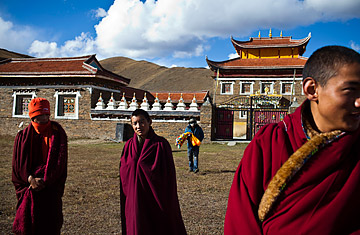
Young Tibetan Monks in Kardze. Throughout greater Tibet, objection to Chinese rule have become increasingly nihilistic.
(4 of 5)
I talk to a half-han, half-Tibetan government official who grew up in Tawu. He is friendly and polite--and he wants me to know the real situation in his hometown. The Tibetans, he says, are greedy. The government gives them everything from preferential loans to new infrastructure, but still they want more. The Tibetan plateau's lunar landscape is littered with clusters of houses the Chinese government built for nomads. Yet like some American real estate developments abandoned during the subprime-mortgage crisis, many of these houses in Kardze are empty. Few Tibetan nomads want to live in Chinese houses. The government worker does not understand it. They are nice houses, he says, much warmer in winter than a yak-wool tent. "If we were to give the Tibetans independence," he says, "they would starve and have no clothes on their back."
Unlike many Chinese communist bureaucrats who merely mouth the appropriate ideology, the Tawu cadre explains his position with conviction. The Dalai Lama and his sister, who escaped to India with him, are the ones orchestrating all the strife, he says, his voice rising in anger. "When the Dalai Lama dies," he tells me, "all of China's problems with the Tibetans will go away. Younger Tibetans are being educated in the proper way, so they won't cause much trouble."
But from everything I've seen, the opposite is true. First, it is young Tibetans who are sacrificing their lives, even though their schooling is steeped in pro-Chinese propaganda. Second, even among the large community of Tibetans in Dharamsala, the seat of the Tibetan government-in-exile, an intense debate is raging over whether the spiritual leader's middle way of nonviolent negotiation with Beijing has done more harm than good. The Dalai Lama is more moderate than many Tibetans, who believe Beijing is unwilling to offer any meaningful concessions. In the Kham highlands, passions are rising with every monk who bursts into flames.
When I visited Dharamsala recently, I met Tsewang Dhondup, a trader from Kardze who fled his homeland after the 2008 unrest. That year, riots between Tibetans and Han led to deaths on both sides. The Chinese military's reaction to further rallies by Tibetans left some 150 dead, according to exile estimates. Dhondup was shot while trying to help a monk who later died of bullet wounds. wanted signs with Dhondup's picture were posted in his village, but friends took him by stretcher high into the mountains. Maggots infested his wounds. Dhondup lived for 14 months on the edge of a glacier before escaping to India. His audience with the Dalai Lama, he says, was the most treasured moment of his life. But even he predicts that "once the Dalai Lama is gone, Tibet will explode."
